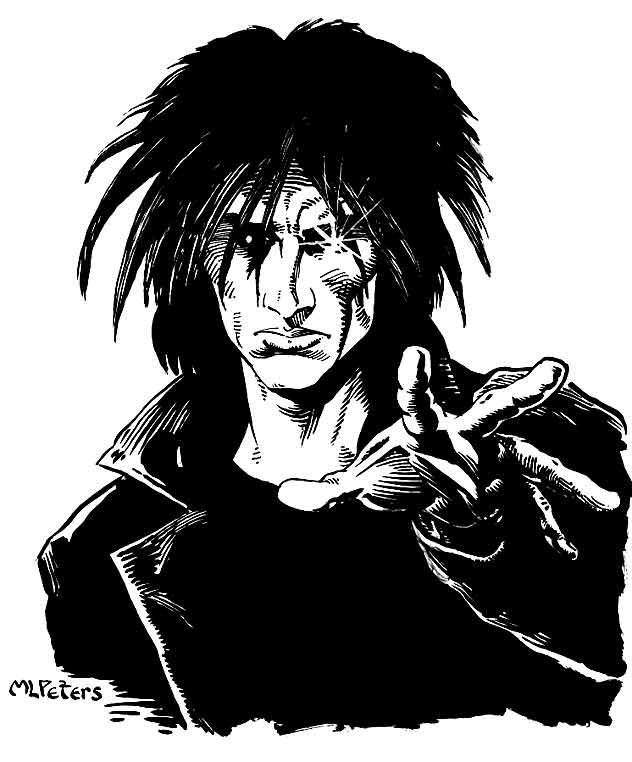Enter Sandman: A Psychoanalytical Approach
Could a rock song be an expression of the id? From what Freud tells us, it seems like Metallica’s heavy metal hit, “Enter Sandman,” is actually an expression of a father’s hatred for his son because of the threat he poses to the parents’ relationship.
Let’s rewind a bit and make sure we understand the basics of Freud’s concept of psychoanalysis. According to Julie Rivkin and Michael Ryan, Freud divided the human personality into three parts: the id, the ego, and the superego, which split into the two subcategories of consciousness or unconsciousness. Whereas consciousness is human control, or reason, unconscious is “a repository of repressed desires, feelings, memories, and instinctual drives, many of which, according to Freud, have to do with sexuality and violence” (Rivkin 389). In the consciousness lies the ego, while in the unconscious exist the superego, the hu
 man conscience, and the id, which is “a combination of sexual libido and other instincts, such as aggression that propel the human organism through life, moving it to grow, develop, and eventually to die” (391). Every person unconsciously struggles between acting on the will of the id or the superego in a kind of tug-of-war.
man conscience, and the id, which is “a combination of sexual libido and other instincts, such as aggression that propel the human organism through life, moving it to grow, develop, and eventually to die” (391). Every person unconsciously struggles between acting on the will of the id or the superego in a kind of tug-of-war.The "Oedipus Complex" is described by Freud as a process through which children learn to model their parent of the same sex because of their sexual desire for the parent of the opposite sex. Because Freud theorizes that literary works,like dreams "embody or express unconscious material in the form of complex displacements and condensations," I argue that this song, a literary work, is a description of singer/songwriter James Hetfield’s aggression toward his son as a result of the "Oedipus Complex" (Rivkin 394).
First, the song is clearly a threat from father to son. The relationship is established within the first two lines: “Say your prayers, little one / don’t forget, my son / to include everyone.” In the chorus, we find the threat: “Sleep with one eye open / gripping your pillow tight.” Why would a father threaten his son? The answer is in Freud’s essay, “Group Psychology and the Analysis of the Ego,” wherein he explains that, as a result of the Oedipus Complex, “the boy notices that his father stands in his way with his mother. His identification with his father then takes on a hostile coloring and becomes identical with the wish to replace his father in regard to his mother as well” (“Group” 439). The song, then, is the father’s unconscious reaction to his son’s efforts to replace him to take away the mother. Perhaps it is for this reason that the songwriter states “Heavy thoughts tonight / And they aren't of Snow White.” Snow White, the feminine, submissive woman who takes care of seven dwarves in a maternal fashion clearly represents the singer’s wife and the child’s mother, the object causing competition between the two.
The threat is only further
 highlighted by the mentioning of the sandman. According to Freud, “a study of dreams, phantasies and myths has taught us that anxiety about one’s eyes, the fear of going blind, is often enough a substitute for the dread of being castrated” (“Uncanny” 424). By threatening his son with the arrival of the Sandman, the father is actually threatening his son with castration as a punishment for desiring the mother. Here we can see that the punishment for a sexual desire appropriately concerns the subject's genitalia.
highlighted by the mentioning of the sandman. According to Freud, “a study of dreams, phantasies and myths has taught us that anxiety about one’s eyes, the fear of going blind, is often enough a substitute for the dread of being castrated” (“Uncanny” 424). By threatening his son with the arrival of the Sandman, the father is actually threatening his son with castration as a punishment for desiring the mother. Here we can see that the punishment for a sexual desire appropriately concerns the subject's genitalia.The entire song is a concoction of the id, which is referenced several times in the song. For instance, the constant referral to dreams reminds one that dreams are manifestations of the id through which "dream-thoughts," or the latent content of dreams, are symbolized by "dream-content," a set of appropriate symbols through which the "dream-thoughts" are censored ("Interpretation" 401-2). Another example of this is the reference to Neverland, which in the story of Peter Pan refers to a place where children can act out the energy of the id. These references to the id suggest that although the song has been processed through the id, it is clearly a manifestation of the id, which Freud has suggested is reflected in all literary works.
Sources:
Freud, Sigmund. "The Interpretation of Dreams." Literary Theory: An Anthology. 2nd Ed. Eds. Julie Rivkin and Michael Ryan. Malden: Blackwell, 2004.
-----. "Group Psychology and the Analysis of the Ego." Literary Theory: An Anthology. 2nd Ed. Eds. Julie Rivkin and Michael Ryan. Malden: Blackwell, 2004.
-----. "The Uncanny." Literary Theory: An Anthology. 2nd Ed. Eds. Julie Rivkin and Michael Ryan. Malden: Blackwell, 2004.
Rivkin, Julie and Michael Ryan. "Introduction: Strangers to Ourselves: Psychoanalysis." Literary Theory: An Anthology. 2nd Ed. Eds. Julie Rivkin and Michael Ryan. Malden: Blackwell, 2004.

0 Comments:
Post a Comment
Subscribe to Post Comments [Atom]
<< Home